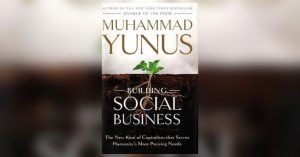Muhammad Yunus, the practical visionary who pioneered microcredit and, with his Grameen Bank, won the 2006 Nobel Peace Prize, has developed a visionary new dimension for capitalism which he calls “social business“. By harnessing the energy of profit-making to the objective of fulfilling human needs, social business creates self-supporting, viable commercial enterprises that generate economic growth even as they produce goods and services that make the world a better place. In case you want to know more about this “non-loss, non-dividend companies” which, I believe, have an astonishing potential to worldwide reinvent the economy and has gone from being a theory to an inspiring practice adopted by leading corporations, do not hesitate to read his book “Building Social Business: The New Kind of Capitalism That Serves Humanity’s Most Pressing Needs” – it truly impacted me.
In this post, I would like to highlight one of the examples described by Muhammad Yunus in his book: Adidas. This corporation started a joint venture with Grameen which aims at producing affordable shoes for the lowest income people in India. Yunus once said: “The goal of Grameen Adidas is to make sure that no one, child or adult, goes without shoes. This is a health intervention to make sure that people in rural areas, particularly children, do not have to suffer from parasitic diseases that can be transmitted through walking barefoot”. Adidas can proudly and loudly state that they are working with Grameen to bring these benefits to the poorest people of the developing world using an economically viable social business model.
However, I would dare to say that Adidas gets much more from that. Firstly, they are able to tremendously learn from user’s reactions and preferences and start building a reputation in emerging countries which appear to be a powerful future market. Secondly, the challenge to produce the world’s first near-one-euro shoe pushes Adidas towards an exploration of new ways of doing business at all levels – engineering, marketing, finance and business development – which later on can turn to be immensely valuable when translated to their core business activity. And finally, they are profiting from the prevailing theory that sustainability is the key driver of innovation and future competitive advantage by heavily investing in extremely affordable, 100% recyclable and desirable sneakers at customer’s eyes.
And you know the best of all this? Adidas is able to embrace all this universe of benefits without losing a penny. That’s precisely the magic of social business: self-sustainability and potential to ethically grow.

